
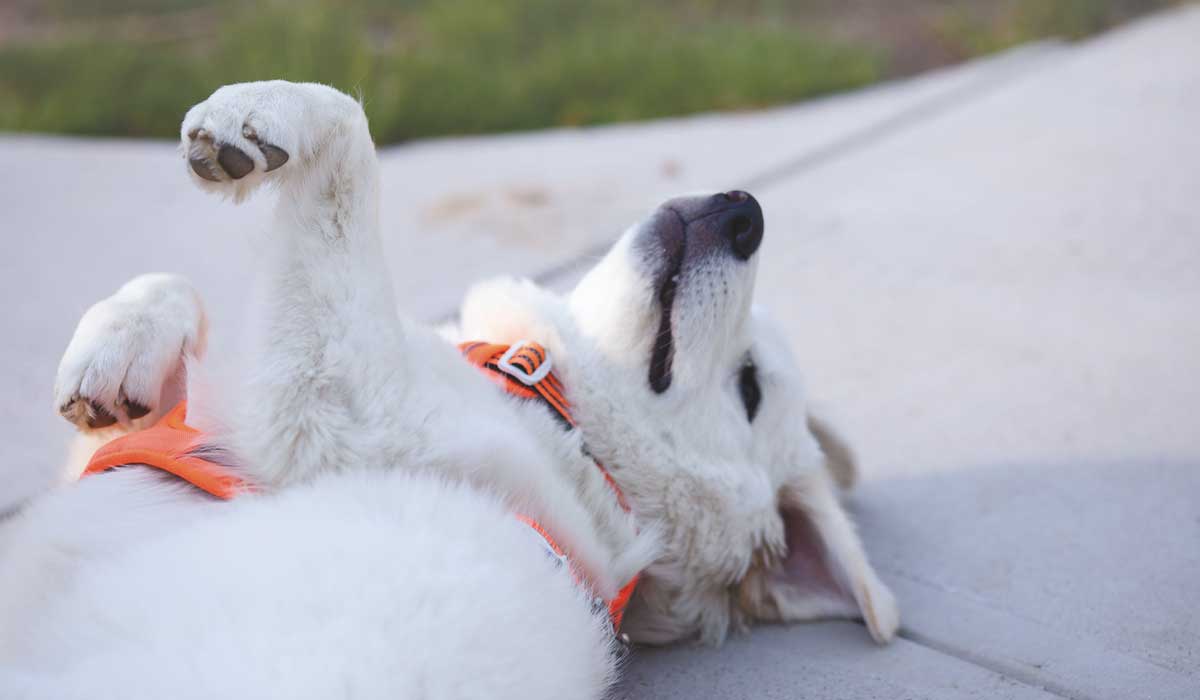
On October 12, 2019, during Fall Reading Days, Anna Shah ’22 went to the shelter in her hometown of West Chester, Pennsylvania, in search of an emotional support dog to help her get through the rest of the semester. With her checklist in hand, envisioning a house-trained dog less than 25 pounds that was good with other animals and people, Shah and her sister waited for the little puppy she saw online to return to her cage.
But the minute they locked eyes with the purebred American Staffordshire Terrier in the cage next door that wasn’t receiving any attention, a budding connection was formed.
This 45-pound dog, commonly known as a pit bull, was severely underweight for its breed; was battling three different infections, elbow dysplasia, and allergies; and had been abandoned on the street by his previous owner—a backyard breeder.
Shah decided to take him for a walk outside to play, and she quickly noticed he was checking off every item on the checklist—besides being small, she noted with a smile. The next day, the two became family, and Shah and Bubba have been inseparable ever since.
“We saved each other,” said Shah, a biology major who was struggling on her pre-med track. “He needed a lot of one-on-one attention for his medical problems, and I knew he couldn’t receive that in a shelter with more than 30 dogs. Academics are very important to me, and not doing well in them was really hard for me to cope with mentally. It came to a point where I was losing hair, my skin was breaking out, and my nails were brittle. After explaining this to my parents, they supported my decision to get an emotional support animal.”
Bubba’s newfound confidence soon transferred to Shah, and she’s had the best semesters yet since he entered her life.
“Taking those extra hours in a day to go on hikes and play with him really improved my grades, as well as my mentality,” Shah said. “He taught me to change the way I look at the world. He showed me that there are other aspects to life than academics.”

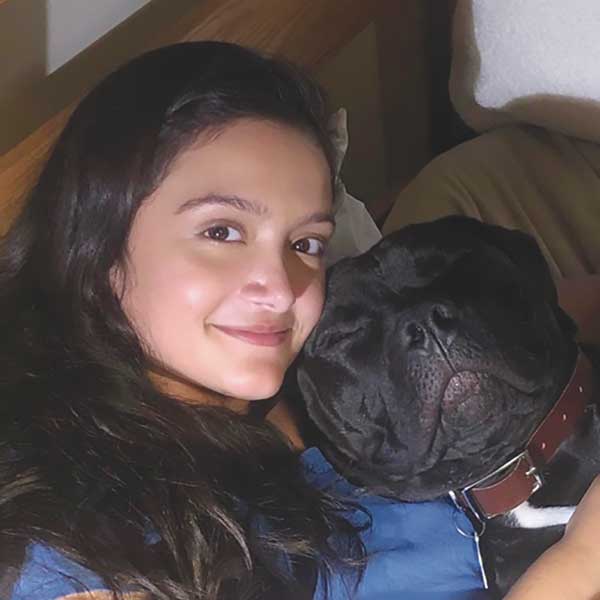
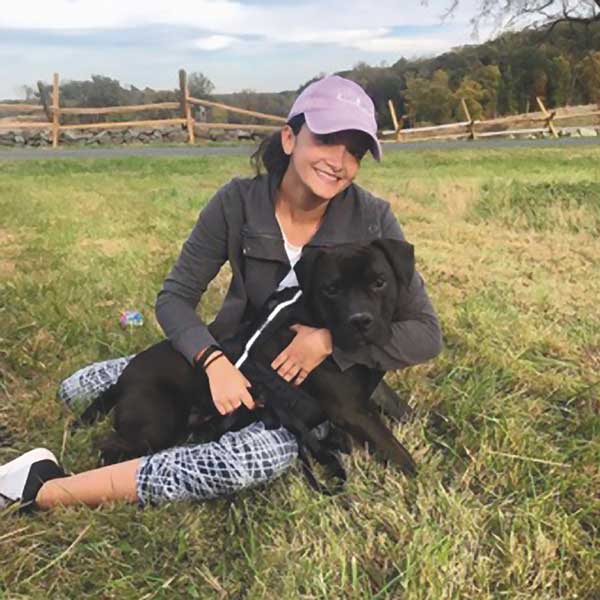
Proven companions
During the Spring 2021 semester, 23 emotional support animals were on campus, the most in the history of the College, which led to new friendships and organized trips to the dog park. Twelve were dogs, eight were cats, two were guinea pigs, and one was a snake. The first one approved was a ferret in 2016. Others have included a rabbit and mouse.
There have also been “Dog Days” on campus, organized by Kathy Bradley, executive director of Health and Counseling Services and associate dean of College Life. This program provides students a break in studying to play with staff members’ dogs to help battle homesickness. Bradley would bring “Dogtor Zach,” a Chocolate Lab that joined the department in 2016 as a certified support animal.
“What students really want is the animal,” Bradley said. “I had a student who one time said, ‘I don’t need to meet with you anymore.’ The care transitions from working with me as a psychologist to meeting with Zach and just having some Zach time.”
While the type of support animal depends on a person’s preferences, it all comes down to companionship.
“Pet ownership has been positively related to happiness levels, as owning a pet often improves one’s physical health, increasing fitness and decreasing cholesterol and blood pressure; mental health, decreasing stress and loneliness, and boosting mood; and social interactions, talking to those who approach your pet in public or bonding over being pet owners,” said Psychology Prof. Natalie Barlett, who teaches a First-Year Seminar on happiness. “It is important to note that research has mainly focused on the benefits of owning dogs, as dogs are social creatures who need a good amount of interaction to thrive.”

In fact, new research points to a parallel genetic code between dogs and people related to sociability, according to Sociology Prof. Connie Devilbiss. While it’s been well-researched in biology and other scientific fields, it’s a relatively new field in sociology. The first discovery linking a rare human syndrome, called Williams syndrome, to the dog genome came in 2010 by evolutionary biologist Bridgett vonHoldt, according to Inside Science. Then, in Sweden in 2018, as noted in Zoological Science, a peer-reviewed scientific journal, Mia Persson and her team of geneticists isolated autism-related genes that are present in both humans and dogs, specifically Golden Retrievers and Labrador Retrievers.
“Sociology really has a unique perspective on it,” said Devilbiss, a U.S. Army and Air Force veteran who has witnessed the impact of a dog’s relationship on fellow veterans and family members with post-traumatic stress disorder. “I’m really coming to this as an extension of my work studying the military sociology angle. … I’ve had to learn this [genome connection]. This is leading-edge research. We’ve also seen some connections on that genome with autism in humans, so it’s a very interesting field of research on the psychological side.”
Devilbiss’ research looks at the reciprocal relationship at “both ends of the leash.” While Devilbiss brings a mechanical dog to Zoom during class, their heart belongs to a Lhasa Apso named Sophie, who passed in 2016. Sophie had always provided tremendous support to her adoptive person, Devilbiss’ sister Bonnie, who underwent several medical setbacks.
“Even though we interact with machines like Alexa and Siri, it’s really a machine; it’s not a sentient being,” Devilbiss continued. “There’s something that has to do with having another heartbeat in your environment that will help many people get through a crisis situation like we’ve all been living through.”
Smart senses
Kim Wojcik ’02, the recipient of Gettysburg’s Young Alumni Achievement Award for Career Development in 2017, uses her liberal arts education and degree in psychology to lead in the counterterrorism division of the Federal Bureau of Investigation (FBI). In her collateral duty as a handler to first- and second-generation FBI canines, Rik and Hoover, she trained them for explosive detection.
“Having a liberal arts undergrad degree was really important for me in my professional career, not just for my case work, but transferring that to working with the dogs,” Wojcik said. “Social psychology, you can apply to dogs, believe it or not. They have their own hierarchy and own pack mentality. You have to figure out why he’s acting some way toward one person in the office or why he’s doing this behavior.”
When a dog owned by one of Wojcik’s coworkers passed away, Hoover immediately sensed it and sat at her feet all day.
“He 100 percent knows when someone’s having a bad day in my office. It’s unbelievable,” Wojcik said. “Besides being a very important tool for the safety and security of our nation, he helps keep the morale up in the office, which is so important to the Bureau. When they come in, he knows they just need a little loving to get through the day.”
Even when Wojcik has to take evidence home from her child abuse cases, Hoover is there for her.
“Animals, regardless of what kind of animal it is, are a nonjudgmental comfort to that human,” Wojcik said. “I can tell you, working crimes against children, it hits you hard. There were quite a few times when I came home, I either had to review some evidence with child abuse in it, or listen to an interview with a child. … [My dog] might not understand, but he understood that I was in pain and he could help ease me through it. Especially what’s going on with COVID right now, these kids are having a hard time coping, and maybe they don’t want to admit it to their friends, but [they] have that emotional support animal. I’m so glad to see that Gettysburg is supporting that kind of program.”
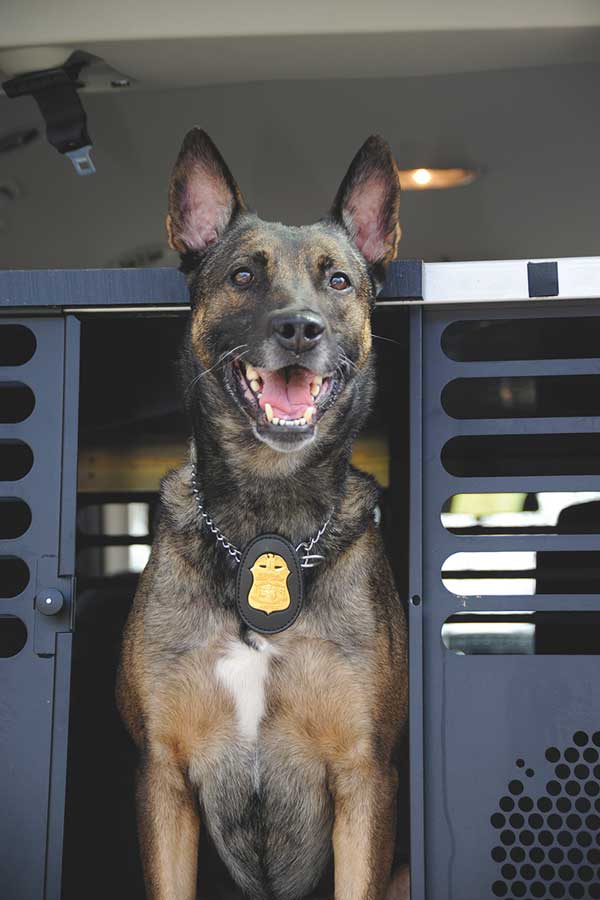
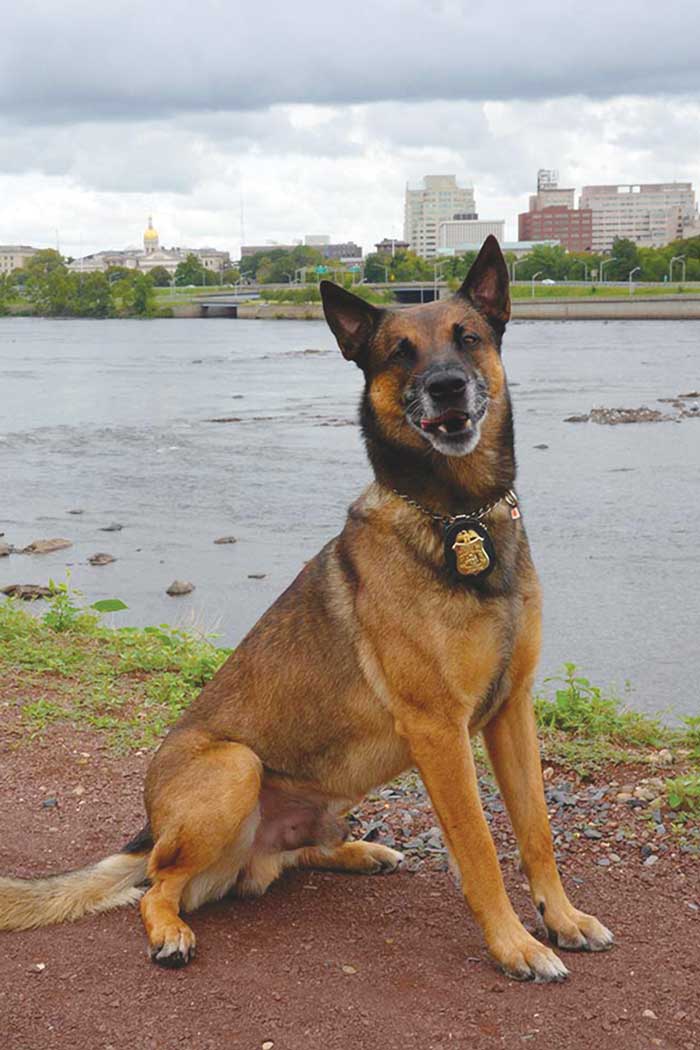
Health and healing
In the middle of finals week during the Fall 2020 semester, the day before Daniel Ziegler ’21 needed a new treatment for his Crohn’s disease at Hershey Medical Center, he decided to get Chiquita, a Pyrenees and Maremma mix, as his emotional support dog. Chiquita’s Instagram account, run by Ziegler, described life during the pandemic as “Hooman: on Zoom. Me: on Zoomies.”
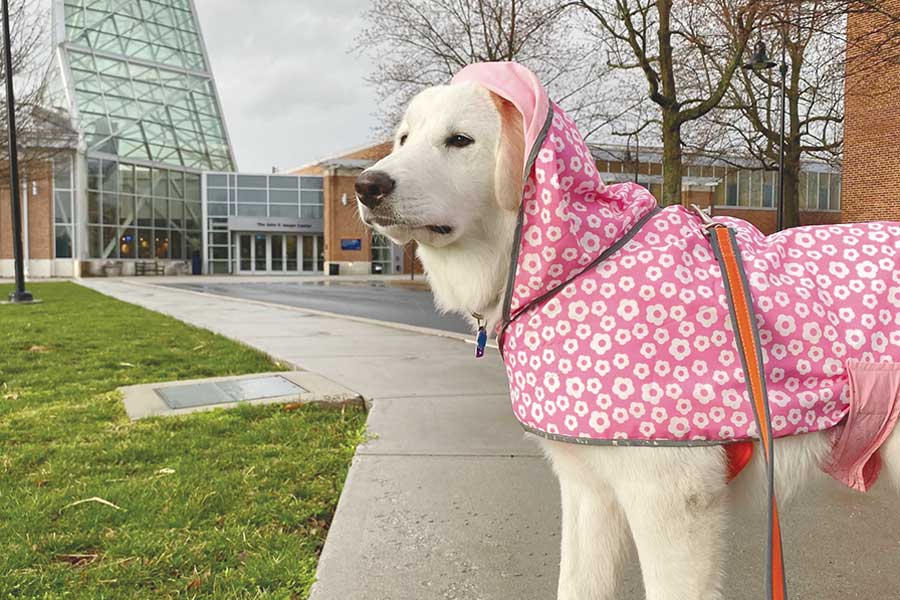
“That sums it up well,” Ziegler said. “I was in the middle of a video game design course on Zoom, and she’s like, ‘No, Dad. I want to stop here. I see a squirrel.’ It reminds me to keep a balance in my life. … I got Chiquita to support my own well-being, but I underestimated the support she would provide for others while on campus. There have been students who have told me that Chiquita is the only reason they got through the week. Dogs, in general, are able to see what you’re going through. There’s this quote that dogs are only a part of our lives, but we are their whole lives. That’s a reminder to me that I have to be better for her.”
Devilbiss, too, will never forget what their dog taught them when Sophie would always stop by a small bed of roses on their daily walks.
“Animals can be a real source of joy all around on both ends of the leash, in terms of health and healing, and comfort and learning,” Devilbiss said. “Stop and smell the roses.”
How does your pet boost your wellness? What fond memories do you hold close? Share your story by emailing alumnimagazine@gettysburg.edu.
by Megan Miller
Posted: 08/31/21


